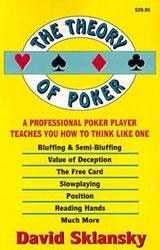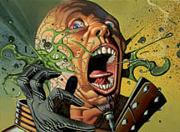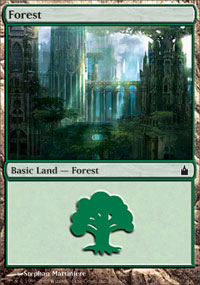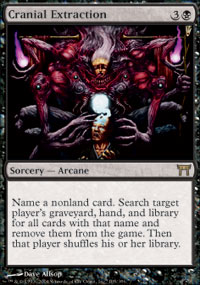
You might not realize it, but Magic and poker aren't all that different. Sure, they both involve playing cards, but there's more to it than that. And quite a few of Magic's top players have realized it. Several pros have crossed over into the poker world, becoming professionals there as well, and at one point this phenomenon raised some questions about the future of Magic. Back in 2004, when Magic pro David Williams finished second in the World Series of Poker, Randy Buehler addressed this concern in his "Latest Developments" column. He came to the conclusion that Magic and poker are fundamentally different games, and each offers something different to players.
While Buehler's right that they're different games, he was also speaking from the perspective of answering whether poker was a threat to Magic. In that light, Buehler focused on pointing out the differences between the games to show that poker could never replace Magic, as Magic gives its fans something that can't be found in poker. But despite all that, there are still strong parallels between the two. And being good at one can really help you with being good at the other.
How so? Even though the fundamental mechanics of the game are completely different, they're both still competitive games played with randomized decks of cards. The nature of such games demands particular skills that can be applied to all similar games, not just poker and Magic. These skills are so necessary at the higher levels of these games, and they help separate the good players from the bad. Any pro Magic player possesses these skills, and because of that, they have an advantage over the average person when they decide to take up poker.

(The Fundamental Theorem of Poker) Every time you play a hand differently from the way you would have played it if you could see all your opponents' cards, they gain; and every time you play your hand the same way you would have played it if you could see all their cards, they lose. Conversely, every time opponents play their hands differently from the way they would have if they could see all your cards, you gain; and every time they play their hands the same way they would have played if they could see all your cards, you lose.
The basis for this theorem is the nature of the game. At its very core, poker is a game of making decisions with incomplete information. And this applies to Magic as well. It's not just a game of cards with special effects; there's much more to the game beyond those pieces of cardboard.
If you're still having trouble interpreting Sklansky's theorem and applying to Magic, think of it this way. Suppose that in a game of Magic, each player had complete information about the cards in the other player's hand and the possible cards he could draw from his library. Then at any given point in the game, there is an optimal play - or multiple optimal plays - that yields the greatest expected value (in this case, the expected value is the probability of winning). Every time a player doesn't choose his optimal play, he has made a "mistake," which means he isn't winning as often as he could be.
Obviously, players don't have complete information in a game of Magic, so the goal is to use the available information to determine what the correct play is. The more information you have, the more able you are to accurately determine the optimal play. At the same time, the less information you give your opponent, the more likely he is to make a mistake, which will increase your own odds of winning.
So there are at least three skill areas related to the nature of these games:
1) Gaining information from your opponent
2) Hiding information from your opponent
3) Using information to select the proper play
The first two are obviously related, as you can't gain much information when your opponent is good at hiding it. Still, they do require different skills.
Pay Attention
One of the most important skills you need is the ability to pay attention. This is true for all aspects of the game, but it's especially necessary for gaining information. There are lots of things going on in a Magic game, and you have to be able to keep track of it all and process that information. Of course, you can always reread a card in play, but you don't want to have to keep doing that when you're evaluating the board. You should always be aware of what's available to both players and what can potentially happen.
But being observant and alert doesn't apply only to the cards; it also applies to players. In poker (particularly in no-limit games), you can't only pay attention to the cards. A significant part of the game is being able to gain information from your opponents. The same is true in Magic, even though many people don't realize it.
Remember that the goal is to make the optimal play at every point of the game. Since Magic is a game of incomplete information, you should be aiming to gain as much information as possible in order to better evaluate the right move. Whether you get it from the cards or the players makes no difference.

Yeah, that's a tell.
Of course, some players get tricky and mix things up, so you also need to be able to evaluate whether your opponent is a tricky player or not. Is he constantly trying to deceive you? If so, you need to watch out for attempts at misinformation. There can be quite a bit of psychological gaming in Magic at the higher levels.
Paying attention applies even outside the game. You can actually gain information about your opponent's deck if he's shuffling towards you so that you can see some cards. This gives you a heads-up about what strategy you're facing and how to adjust accordingly. You can also get information when some players sideboard by watching how many cards are being swapped. Even something as seemingly innocent as your opponent setting aside some tokens/counters at the start of the game can give you an edge.
Poker players will often talk it up to produce reactions from their opponents. Magic's a friendlier environment, so you may upset some players if you're talking too much or if you're intentionally trying to annoy them, so you should be careful with this tactic. When done right, however, you can glean some pretty useful information. Sometimes, friendly questions at the start of the game can give you an indication of how strong you can expect your opponent's deck to be, or what bombs or removal you might be facing.
Inferring information during a game is also important. Ask yourself questions about your opponent's plays. Why did he not attack with this creature? Why did he leave these particular lands untapped? Why did he change his mind about what he was going to play? Little questions like these can reveal a lot about your opponent's intentions.
No Free Information
While you're working to extract as much information from your opponent as possible, you're also working to prevent him from doing the same. You need some level of self-awareness to prevent yourself from giving out free information and to keep track of what information you have given out. And as I mentioned before, you may also want to practice spreading misinformation.
Obviously, all the things I mentioned in the previous section should be considered when hiding information. There are plenty of other additional items that should be mentioned. So here's an abridged list of considerations:
- Be aware of your own behaviors. To get rid of your tells, you need to first detect them. Whenever you notice yourself doing something unusual, see whether it was triggered by a certain situation. Do you start shuffling your hand when you get nervous? Do you tend to get quiet when you're trying to trap your opponent? Do you play faster when you're excited? You can also practice with other players to help identify each other's tells.
- In addition to minor behavioral tells, you also have to watch out for the big ones. Does your facial expression noticeably change? Do you sigh or react visibly when you draw a useless card, or begin looking eager when you draw a strong card? On many occasions, I've been able to win games comfortably knowing that my opponent wasn't holding a trick that could have swung the game, simply by watching him draw his card for the turn.
- The previous point also applies to making decisions. When I attack in the early game and I see my opponent look at his hand and think for a while, then finally choose to take the damage, I can be fairly sure he has a trick or removal spell in hand that he's saving for something later. Feel free to think over your decisions carefully, but don't make your thought processes obvious. The speed of your decisions is also a factor; this can indicate to an opponent whether you even have any options available to you or whether you've got some tricks up your sleeves that you're eager to use.
- Don't give free information. Don't talk about your hand, or cards in your deck that your opponent hasn't seen. As I discussed earlier, it is possible to gain information outside the game, so be careful. Don't shuffle with your cards facing outward, for example. You can also hide information about your sideboarding - shuffle your sideboard and deck together, then pull out the 15 cards you don't want. Do this even if you're not making any changes.
- Don't make unnecessary plays. One particular example is playing land. I've played many drawn-out games where both of us have plenty of land, and my opponent is in topdeck mode. He draws his card, then adds a land to the table. And this is enough to seal the game, since I know for certain that he has no tricks available. If he had held the land instead, I would've been worried about possible trickery and adjusted my play. This is also a bad play for another reason - there have also been several occasions where having a spare card in hand saved my bombs from discard spells.
- As another tip about playing land, don't play land before combat unless you need the mana open. You can trick your opponents into thinking that you have less mana available than you actually do, surprising them after combat when you play your land and something else. If your opponents notice this habit, you also have the option of mixing things up and playing land before combat to make them think you have a reason for wanting the mana available.
- Don't sort your hand. In fact, regularly shuffle it. Some players will try to track the cards in your hand - what card you drew at a given time, cards that have returned to your hand, etc. If you're the type to sort your hand into spells and lands, or by color, you're giving away even more free information about what you're holding.

Do you really need that 12th forest?
To repeat: hiding information is an important skill in all games of incomplete information. If you've played poker, you may have noticed how some of the above tips apply there. Giving free information can lose you lots of money at the poker table. Similarly, it can lose you lots of games in Magic.
Weighing the Options
Aside from the information war, games like poker and Magic require you to make correct decisions, and that's what really determines the outcome of the game. You can't win unless you make the right decisions, no matter how much information you have. Of course, finding the optimal play in Magic can be much more difficult than in poker, since the game is much more dynamic and has more options. At the same time, though, Magic tends to be a more forgiving game than poker, and small mistakes aren't usually as fatal (particularly compared to no-limit poker).
The details of evaluating your options differs greatly from poker, but the general idea is the same for all decision-making games. You're using the available information to examine possible outcomes, and then assigning each possible choice an "expected value." Most players do this unconsciously - they simply look at their options and say, "I think doing A is better than doing B for such and such reasons," rather than going through an exhaustive analysis of the choices. The key is to be able to make these decisions quickly and confidently, while also making sure to account for all possibilities.
Although decision making is the most important part of the game, I'm not going to say much here since it's far beyond the scope of this article. Making the correct decisions involves understanding the fundamental parts of the game and encompasses a broad range of theory. There are plenty of articles out there that cover individual topics, and it would be impossible to provide a decent list without overlooking many quality articles.
There is one particular topic I feel deserves mention here, though. Chad Ellis talked about it in his "The Danger of Cool Things..." and there's a fairly well-known term for it in the poker world: Fancy-Play Syndrome (FPS). A lot of players get caught up in trying to make an impressive play or getting too creative in a situation, when in actuality they're choosing an option that's slightly marginal at best. While such a play might seem "cool" and can reap big rewards, you also have to think about what happens when it backfires. A big risk-big reward play isn't necessarily better than a small risk-small reward play, especially when the play involves your opponent falling for a not-so-subtle trap.
Playing Your Opponent
Although trying to lure your opponent into a trap isn't very reliable, it can be done under the right circumstances. One common error among players is underestimating the extent to which you can actually play your opponent rather than simply playing the cards. Most players will concede when they don't have the necessary cards to win directly, and they won't even think of trying to win in another way. But just as in poker, you can win even when you don't have the best hand. While it's true that the cards will heavily determine the course of the game, there's still the interpersonal element of the game that can be a major factor. It's more obvious in poker, but it still exists in Magic. As I mentioned before, detecting and hiding information is critical, but misinformation and deception can also be just as important.
Deception can take a variety of forms (other than cheating, obviously). Your goal is to take advantage of your opponent by forcing him to make a tough decision with his limited information, along with any inaccurate expectations on his part. Deception often manifests itself in combat, where each player might have a variety of tricks available. When your opponent sends some creatures into combat that are seemingly sure to die at the hands of your blockers, you really have to stop and wonder, "Why is he making this play? Is it a bluff, or does he want me to make the obvious move?"

Soh at PT Nagoya
Soh opted to let Karsten's Moss Kami and Harsh Deceiver through. He correctly inferred that Karsten had a land on top of his library, and with the Deceiver's ability and the Moth's ability, it was enough for Karsten to deal 8 damage to finish the game. Karsten used the Deceiver's ability to pump and untap it, and Soh was looking at the receiving end of 7 points of damage. But Soh couldn't win unless the Moth was tapped, and decide to bait Karsten by dangling the win in front of his eyes. Soh initiated the bluff by asking the judge if he was at 9 life, and when the judge informed him he was at 8, he pretended to be surprised. This suggested to Karsten that Soh had no help from his cards and was hoping to survive the turn at 1 life.
Karsten, alerted by Soh's "mistake," had to decide whether it was a bluff or not. Trying to further induce Karsten to fall for the trap, Soh eagerly asked Karsten whether he wanted to stack the 7 damage. This was enough to lure him in, and Karsten opted to pump with the Moth, hoping for the win. Soh revealed his plans by playing Soulless Revival on a Gibbering Kami, triggering his Thief of Hope to let him survive at 1 life. The next turn, he played two Spirits, and swung with just enough to take the win.
That brilliant bluff sparked a lot of talk, but that game actually contained much more deception than just that last play. If you read Soh's article, you'll see some more examples of Soh's thought processes and plays, all of which demonstrate the three things I've mentioned: gathering information, hiding information, and using information.
This isn't the first time that bluffing has been used in Magic. Many players use bluffs all the time in their games (and don't get attention for it because they're not in a major tournament match). Even in the major matches, you'll often see mind games being played. Older players may remember Mike Long's match against Mark Justice at PT Paris in 1997, where Justice didn't realize that Long only had 1 Drain Life in his ProsBloom deck (and had sided out his Elven Caches). Long ended up pitching the Drain Life and proceeded to combo off as if he was going to win, inducing Justice to concede under the assumption that Long still had a win condition. It was Justice's mistake, of course, but Long still deserves credit for making the attempt.
Most of the time, big bluffs are still not very solid plays. Remember, you don't want to be guilty of Fancy-Play Syndrome. But there are times where you're already in a very bad spot, and you'll inevitably lose if you don't do anything. In those cases, the big risk of such plays is negated (since you'll lose anyway), and attempting the bluff is well justified.
More on the Information War
There's a lot more to be said about the information war in Magic, and if you look around, you'll see lots of articles written on the subject. For example, back when blue was in full force, people were writing about how to play in counter wars and the bluffing and baiting involved in those matches.
A more recent article is Zvi Mowshowitz's "Winning the Information War," published on the Wizards site in March. He describes a particularly intriguing example: in game 1 of a match, one player took a mulligan. He looked at his new hand, and mulliganed again. He then went down to four and still had an unplayable hand. So what did he do? Rather than keep it or try to find a better hand, he mulliganed all the way to zero. Every turn, he drew a card without looking at it and passed the turn. His opponent finished him off easily, but at a cost - the first player knew exactly what he was up against and was able to sideboard effectively, giving him a much easier game 2 and eventually winning him game 3 as well. The opponent, on the other hand, knew nothing about the first player's deck, putting him at a strong disadvantage for the second game.

Secret spy tech.
The Last Hand...
As I always say, don't just think of Magic as a simple game of cards. Winning doesn't just mean building the right deck or drawing the right card at the right time; it also means playing the information war. You can't make the best decisions without the right information, and every error you make is costing you in some way. You might not notice that little disadvantage at the time, but all of those small things accumulate, eventually losing you games that you should have won.
Remember that all of this applies to any decision-making game of incomplete information, not just poker and Magic. But I play those games the most, which is why I tend to compare the two. Just keep in mind that these skills, in general, are critical for being competitive in any similar game, and you can take the ideas here and use them elsewhere.
Fortunately, the majority of players are conscious of improving their skill in decision making, and that makes up most of the game in Magic. But those that are also consciously improving their skills in gathering information and hiding information will have the upper hand, and those are the people you'll usually see at the top of the tournament lists. So if that's where you want to be, start thinking beyond the cards.
-
View User Profile
-
Send Message
Posted Feb 4, 2022